Two-Stage Robust Optimization Model for Flexible Response of Micro-Energy Grid Clusters to Host Utility Grid
Abstract
1. Introduction
2. Flexibility Response Scheme of Micro-Energy Grid Clusters
2.1. Basic Operating Structure
2.2. Each-Unit Operation Model
2.2.1. Distributed Energy Resources
- (1)
- Wind-generated electricity
- (2)
- PV power generation
2.2.2. CHP Unit
2.2.3. Energy Storage Device
2.3. Flexibility Response Mode
3. Measurement Model of Flexible Response Capability of MEG Clusters
3.1. MEG Scheduling Optimization Model
3.1.1. Objective Function
3.1.2. Constraint Condition
- (1)
- Energy balance constraint
- (2)
- Equipment operation constraints
- (3)
- Energy storage device constraints
3.2. Measurement of Flexibility Response Capability
3.2.1. Power Supply Side Surplus Power Generation Capacity
3.2.2. Load-Side Depth-Response Capability
4. Optimization Model for MEG Cluster Flexibility Response to Host Utility Grid
4.1. Two-Stage Robust Theory
4.2. Flexibility Response Two-Stage Robust Scheduling Optimization Model
4.2.1. Deterministic Model
- (1)
- Objective function
- (2)
- Constraint condition
- (1)
- Electric energy balance constraint
- (2)
- MEG cluster constraints
- (3)
- Thermal power unit constraints
- (4)
- Energy storage constraints
4.2.2. Two-Stage Robust Reconstruction
5. Example Analysis
5.1. Basic Data
5.2. Analysis of Effect
6. Conclusions
- (1)
- MEG clusters effectively respond to host utility grid dispatching demands, reducing overall operational costs by 6.7% compared to autonomous grid optimization while outperforming individual MEG responses. The cluster-based approach demonstrates a positive correlation between dispatched response capacity and cost reduction magnitude. Concurrently, renewable curtailment rates decrease significantly, with cluster response achieving a 9.48% reduction in wind/PV curtailment, substantially improving system-wide economic efficiency.
- (2)
- The proposed two-stage robust model effectively mitigates renewable generation uncertainties, reducing curtailment variability by 58% under ±20% forecast errors compared to conventional stochastic methods. This enhances grid operational stability while maintaining adaptability to extreme supply/demand mismatches. Additionally, compared to TP units, MEG clusters exhibit superior operational flexibility in balancing grid supply/demand dynamics, which can effectively replace some TP generation and flexibly adjust the power supply and demand balance of the host utility grid.
- (3)
- Compared with the response of individual MEGs, the cluster response can smooth the output curve, further reduce the climbing and coal consumption cost of TP units, and reduce the abandoned power of new energy. The framework contributes to regional carbon neutrality targets by reducing coal consumption by 9.7%. Furthermore, the energy-centric bidding mechanism aligns with China’s latest electricity market reforms, which prioritize MEG clusters as critical assets for low-carbon power systems.
Author Contributions
Funding
Data Availability Statement
Conflicts of Interest
Nomenclature
| Abbreviations | electrical energy held within the storage unit at time t | ||
| MEG | micro-energy grid | charging and discharging power of the storage device at time t | |
| DERs | distributed energy resources | total operating cost of MEG | |
| DR | demand response | expenses on fuel | |
| CHP | combined heat and power | costs of operation and maintenance | |
| PV | photovoltaic | penalty costs from renewable energy abandonment | |
| WT | wind turbines | purchase heat and sale heat of MEG at time | |
| TP | thermal power | power and maintenance cost of equipment | |
| PBDR | price-based demand response | maintenance cost of energy storage equipment | |
| IBDR | incentive demand response | heat price | |
| C&CG | Column-and-Constraint Generation | gas price | |
| Sets | penalty cost | ||
| t | index for time | power output and the internal power consumption rate of power generation equipment | |
| index for equipment | controllable load | ||
| n | index for MEG | user loads | |
| Scalars | state of the battery | ||
| efficiency of the PV system in converting solar energy to electricity | heat load at time | ||
| power generation efficiency of CHP unit | CHP unit’s start/stop status | ||
| heat-to-electricity proportion for the CHP unit | maximum charging and discharging power of energy storage equipment | ||
| natural loss coefficient of the electric energy stored in the storage device | capacity at time | ||
| charge and discharge efficiency of the storage device | maximum permissible surplus generation capacity from the source-side infrastructure of MEG at time | ||
| self-elasticity coefficient and cross-elasticity coefficient | peak residual generation thresholds for distributed renewable assets within the MEG | ||
| CO2 emission intensity coefficients for TP and MEG systems | cogeneration unit dispatchable reserves within the MEG | ||
| loss coefficient characterizing auxiliary energy utilization within thermal generation facilities | energy storage system regulation capacity within the MEG | ||
| self-loss coefficient | forecasted WT and PV generation values | ||
| , | charge-discharge efficiency | scheduled dispatch targets for WT and PV power | |
| Parameter | nameplate capacity and real-time generation setpoint of CHP systems | ||
| wind speed | PBDR and IBDR planned response at time t | ||
| cut-in and cut-out wind speeds of the fan | power demand at time | ||
| rated wind speed | IBDR Response Status | ||
| rated power of wind power generation | predicted value of the load | ||
| area of PV array | wind power | ||
| direct solar irradiance at time t | photovoltaic output power | ||
| upper and lower bounds of the ramping rate | load power | ||
| maximum threshold for load response | upper limits for fluctuation deviations in wind power | ||
| expected return rate of MEG | upper limits for fluctuation deviations in photovoltaic output | ||
| , , | coal consumption coefficient of the TP unit | upper limits for fluctuation deviations in load power correspondingly | |
| time-dependent fuel cost for TP generation | aggregated cross-temporal operational cost for resource orchestration | ||
| carbon pricing coefficient under emission cap constraints | MEG cluster demand/response coordination cost | ||
| penalty price for renewable energy curtailment | generation cost of TP | ||
| time-of-use tariff for energy storage charging/discharging operations | distributed electrochemical storage capacity cost | ||
| maximum allowable power descent rate for MEG | carbon emission cost | ||
| threshold of instantaneous power ascent capacity for MEG complying with dispatch protocols | variable renewable energy integrated power generation cost | ||
| peak and valley thresholds for charging operations | lifecycle reliability maintenance levy for critical infrastructure | ||
| permissible range for discharging processes | response power of MEG | ||
| real-time energy reserves and nominal storage capability | power generation cost of MEG . | ||
| , | operational boundaries of power conversion system loading ratio | energy storage charge and discharge power at time | |
| Variables | real-time active power output of the ith TP unit | ||
| power of wind power generation at time t | binary commitment status of the ith TP unit | ||
| power generated by the PV system at time t | binary control variables for storage charge/discharge states | ||
| generation power of the CHP unit at time t | capital expenditure and operational expenditure for wind power conversion | ||
| heating power of the CHP unit at time t | unit-specific maintenance cost rates for ith TP units and storage systems | ||
| volume of natural gas purchased by MEG at time t | steady-state demand profile of the upper power grid | ||
| minimum technical operating duration and mandatory cooling interval of unit | cumulative online duration and accumulated offline period of unit i at time | ||
References
- Wang, Z.; Chen, L.; Li, X.; Mei, S.A. Nash Bargaining Model for Energy Sharing between Micro-Energy Grids and Energy Storage. Energy 2023, 283, 129065. [Google Scholar] [CrossRef]
- Ju, L.; Lu, X.; Li, F.; Bai, X.; Li, G.; Nie, B.; Tan, Z. Two-Stage Optimal Dispatching Model and Benefit Allocation Strategy for Hydrogen Energy Storage System-Carbon Capture and Utilization System-Based Micro-Energy Grid. Energy Convers. Manag. 2024, 313, 118618. [Google Scholar] [CrossRef]
- Li, J.; Li, Y.; Ma, L.; Li, Z.; Ma, K. Research on Modeling and Control Strategy of Lithium Battery Energy Storage System in New Energy Consumption. Energy Rep. 2023, 9, 182–189. [Google Scholar] [CrossRef]
- Yi, T.; Li, Q.; Zhu, Y.; Shan, Z.; Ye, H.; Xu, C.; Dong, H. A Hierarchical Co-Optimal Planning Framework for Microgrid Considering Hydrogen Energy Storage and Demand-Side Flexibilities. J. Energy Storage 2024, 84, 110940. [Google Scholar] [CrossRef]
- Xiao, G.; Liu, H.; Nabatalizadeh, J. Optimal Scheduling and Energy Management of a Multi-Energy Microgrid with Electric Vehicles Incorporating Decision Making Approach and Demand Response. Sci. Rep. 2025, 15, 5075. [Google Scholar] [CrossRef]
- Wang, J.; Lyu, C.; Bai, Y.; Yang, K.; Song, Z.; Meng, J. Optimal Scheduling Strategy for Hybrid Energy Storage Systems of Battery and Flywheel Combined Multi-Stress Battery Degradation Model. J. Energy Storage 2024, 99, 113208. [Google Scholar] [CrossRef]
- Wu, N.; Wang, Z.; Li, X.; Lei, L.; Qiao, Y.; Linghu, J.; Huang, J. Research on Real-Time Coordinated Optimization Scheduling Control Strategy with Supply-Side Flexibility in Multi-Microgrid Energy Systems. Renew. Energy 2025, 238, 121976. [Google Scholar] [CrossRef]
- Datta, J.; Das, D. Energy Management of Multi-Microgrids with Renewables and Electric Vehicles Considering Price-Elasticity Based Demand Response: A Bi-Level Hybrid Optimization Approach. Sustain. Cities Soc. 2023, 99, 104908. [Google Scholar] [CrossRef]
- Armghan, H.; Xu, Y.; Bai, X.; Ali, N.; Chang, X.; Xue, Y. A Tri-Level Control Framework for Carbon-Aware Multi-Energy Microgrid Cluster Considering Shared Hydrogen Energy Storage. Appl. Energy 2024, 373, 123962. [Google Scholar] [CrossRef]
- Zheng, Q.; Yang, P.; Wu, Y.; Xu, Z.; Zhang, P. Optimal Dispatch and Control Strategy of Park Micro-Energy Grid in Electricity Market. Sustainability 2023, 15, 15100. [Google Scholar] [CrossRef]
- Liu, X.; Lu, H.; Zhao, W.; Chen, Y.; Shao, S. Research on Optimal Scheduling and Source-Network-Load Correlation Matching of Integrated Energy System Considering Uncertainty. Energy 2025, 321, 135421. [Google Scholar] [CrossRef]
- Zhang, J.; Liu, Z.; Liu, Y. A Scheduling Optimization Model for a Gas-Electricity Interconnected Virtual Power Plant Considering Green Certificates-Carbon Joint Trading and Source-Load Uncertainties. Energy 2025, 315, 134470. [Google Scholar] [CrossRef]
- Fan, Y.; Liu, W.; Zhu, F.; Wang, S.; Yue, H.; Zeng, Y.; Xu, B.; Zhong, P.-A. Short-Term Stochastic Multi-Objective Optimization Scheduling of Wind-Solar-Hydro Hybrid System Considering Source-Load Uncertainties. Appl. Energy 2024, 372, 123781. [Google Scholar] [CrossRef]
- Feng, J.; Ran, L.; Wang, Z.; Zhang, M. Optimal Energy Scheduling of Virtual Power Plant Integrating Electric Vehicles and Energy Storage Systems under Uncertainty. Energy 2024, 309, 132988. [Google Scholar] [CrossRef]
- Wang, T.; Hua, H.; Shi, T.; Wang, R.; Sun, Y.; Naidoo, P. A Bi-Level Dispatch Optimization of Multi-Microgrid Considering Green Electricity Consumption Willingness under Renewable Portfolio Standard Policy. Appl. Energy 2024, 356, 122428. [Google Scholar] [CrossRef]
- Jani, A.; Karimi, H.; Jadid, S. Hybrid Day-Ahead and Real-Time Energy Trading of Renewable-Based Multi-Microgrids: A Stochastic Cooperative Framework. Sustain. Energy Grids Netw. 2024, 40, 101516. [Google Scholar] [CrossRef]
- Lv, Q.; Wang, L.; Li, Z.; Song, W.; Bu, F.; Wang, L. Robust Optimization for Integrated Production and Energy Scheduling in Low-Carbon Factories with Captive Power Plants under Decision-Dependent Uncertainty. Appl. Energy 2025, 379, 124827. [Google Scholar] [CrossRef]
- Ju, L.; Liu, L.; Han, Y.; Yang, S.; Li, G.; Lu, X.; Liu, Y.; Qiao, H. Robust Multi-Objective Optimal Dispatching Model for a Novel Island Micro Energy Grid Incorporating Biomass Waste Energy Conversion System, Desalination and Power-to-Hydrogen Devices. Appl. Energy 2023, 343, 121176. [Google Scholar] [CrossRef]
- Ju, L.; Lu, X.; Yang, S.; Li, G.; Fan, W.; Pan, Y.; Qiao, H. A Multi-Time Scale Dispatching Optimal Model for Rural Biomass Waste Energy Conversion System-Based Micro-Energy Grid Considering Multi-Energy Demand Response. Appl. Energy 2022, 327, 120155. [Google Scholar] [CrossRef]
- Lu, G.; Bai, X.; Qi, X.; Zhang, F.; Yan, X.; Feng, J.; Ju, L. Data-Model Fusing Driven Robust Configuration Optimization Model and Decision-Making Method for Renewable Energy Generation Base Considering Electric-Hydrogen Conversion. Renew. Energy 2025, 241, 122320. [Google Scholar] [CrossRef]
- Ju, L.; Lv, S.; Zhang, Z.; Li, G.; Gan, W.; Fang, J. Data-Driven Two-Stage Robust Optimization Dispatching Model and Benefit Allocation Strategy for a Novel Virtual Power Plant Considering Carbon-Green Certificate Equivalence Conversion Mechanism. Appl. Energy 2024, 362, 122974. [Google Scholar] [CrossRef]
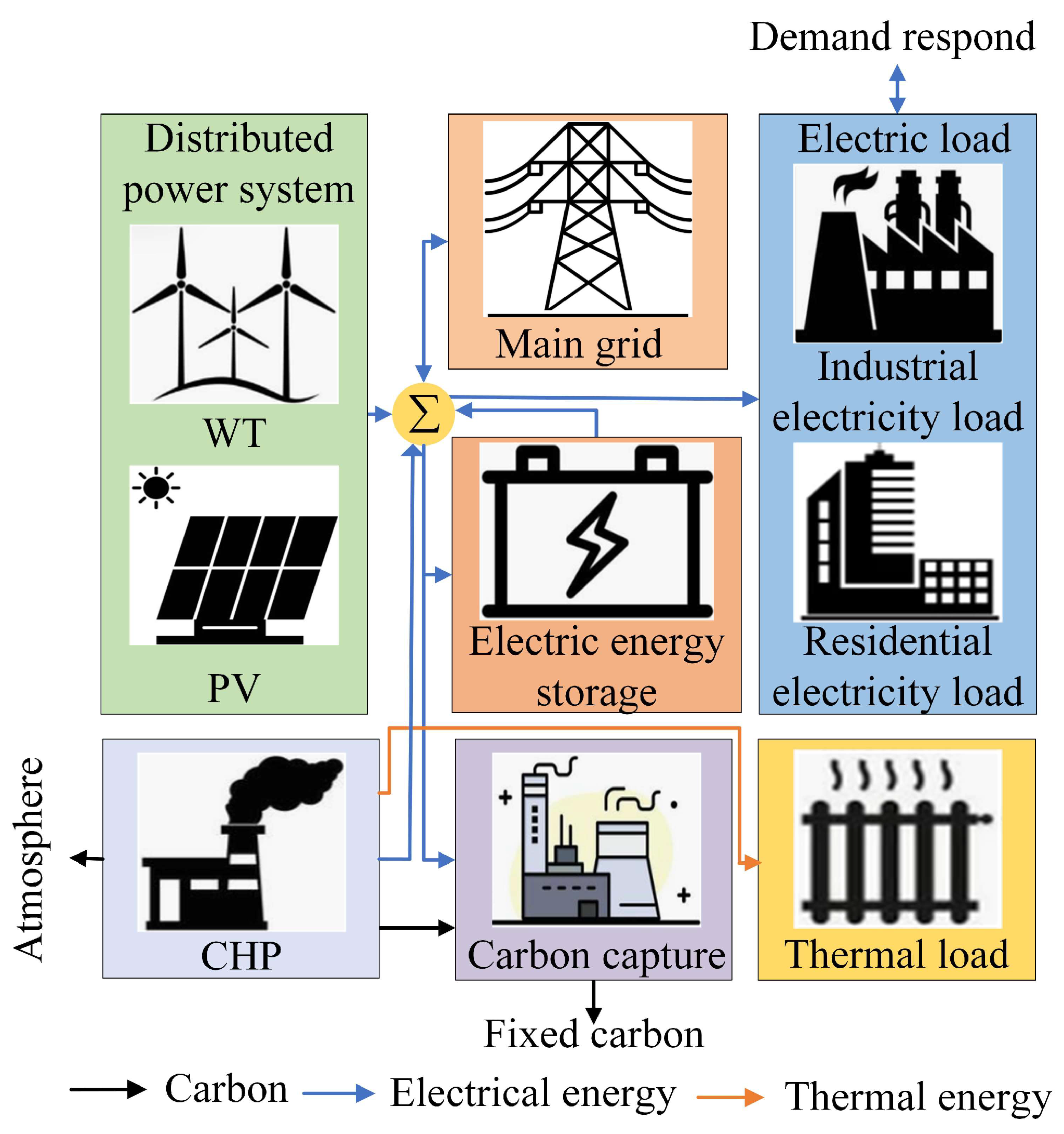
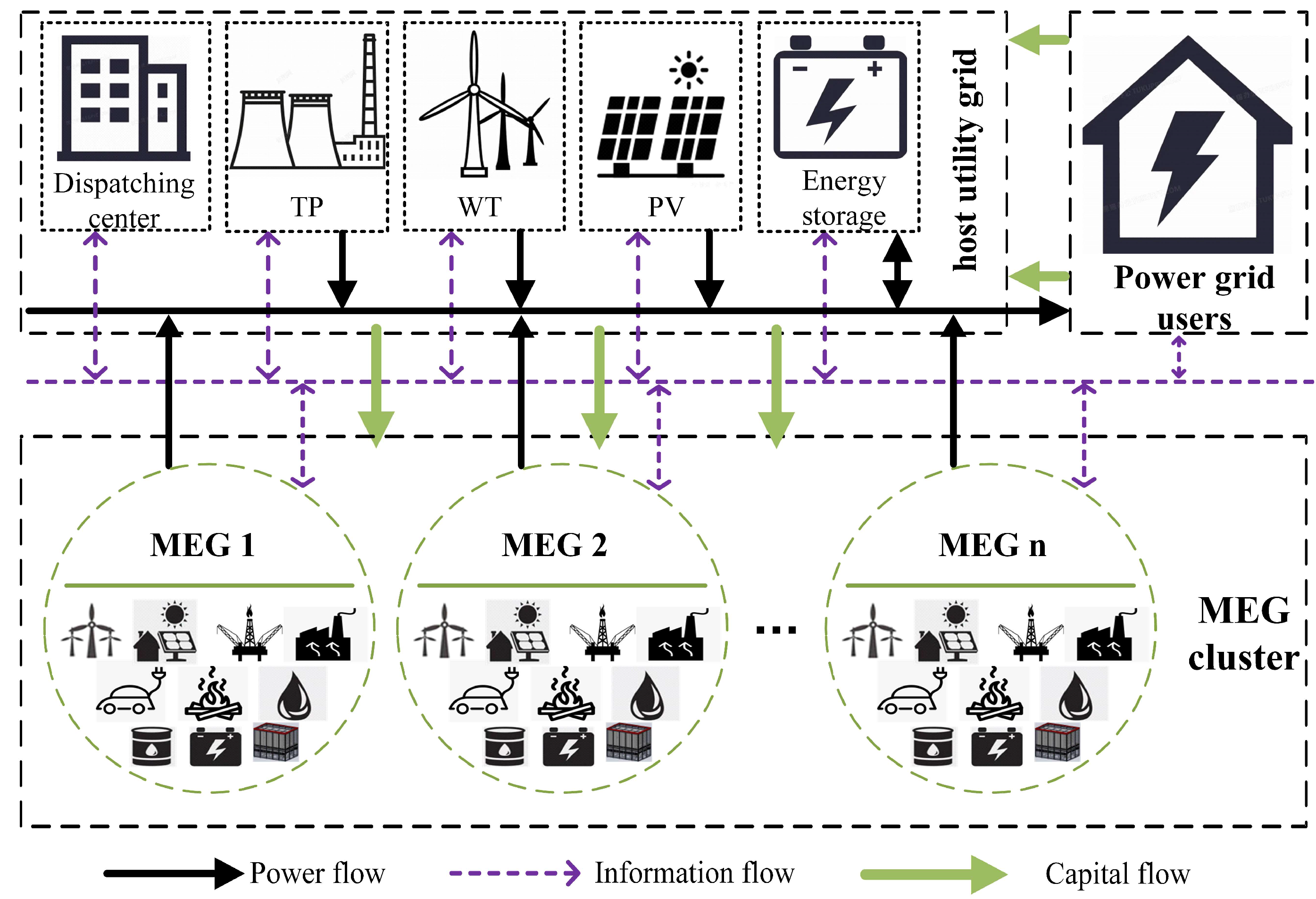

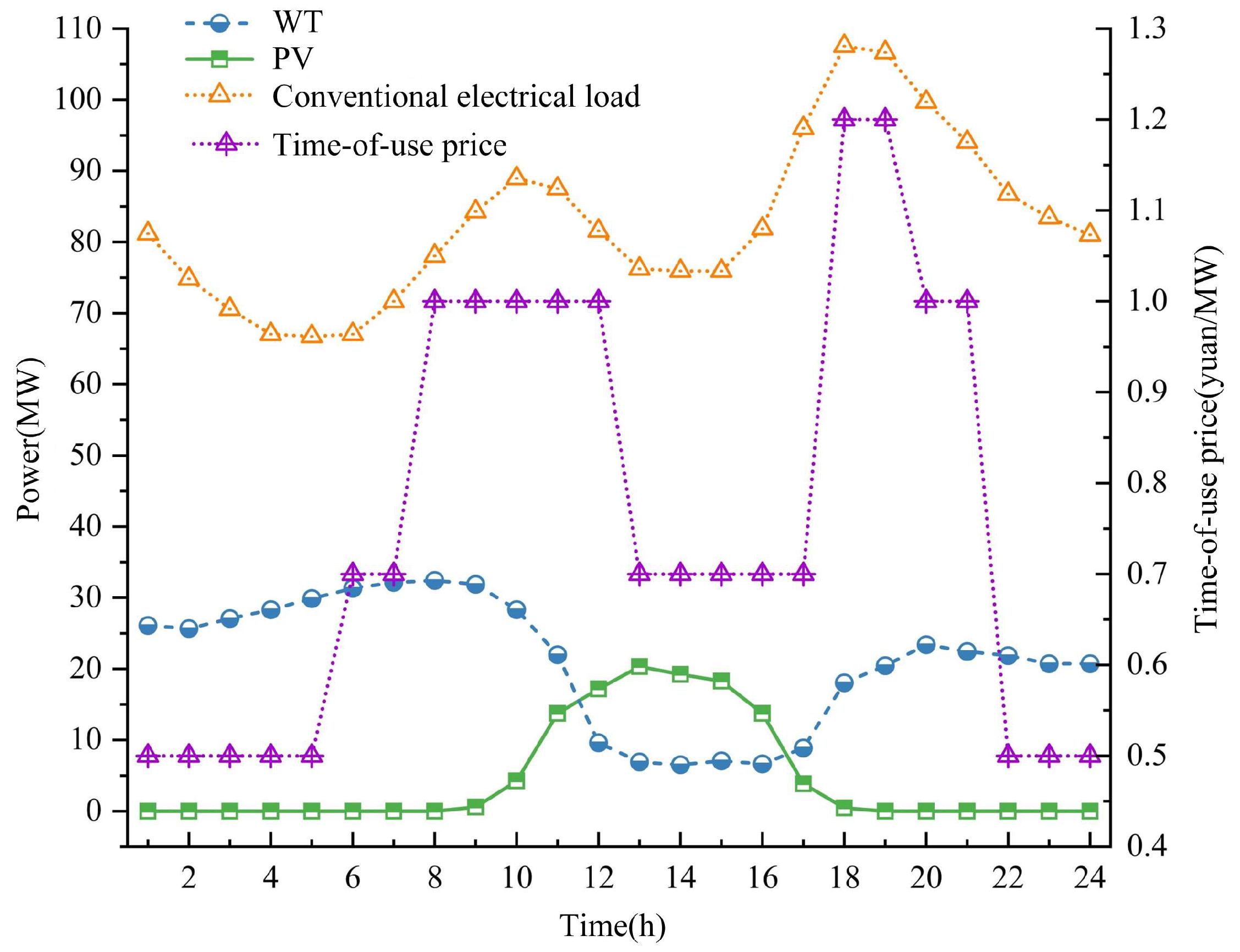
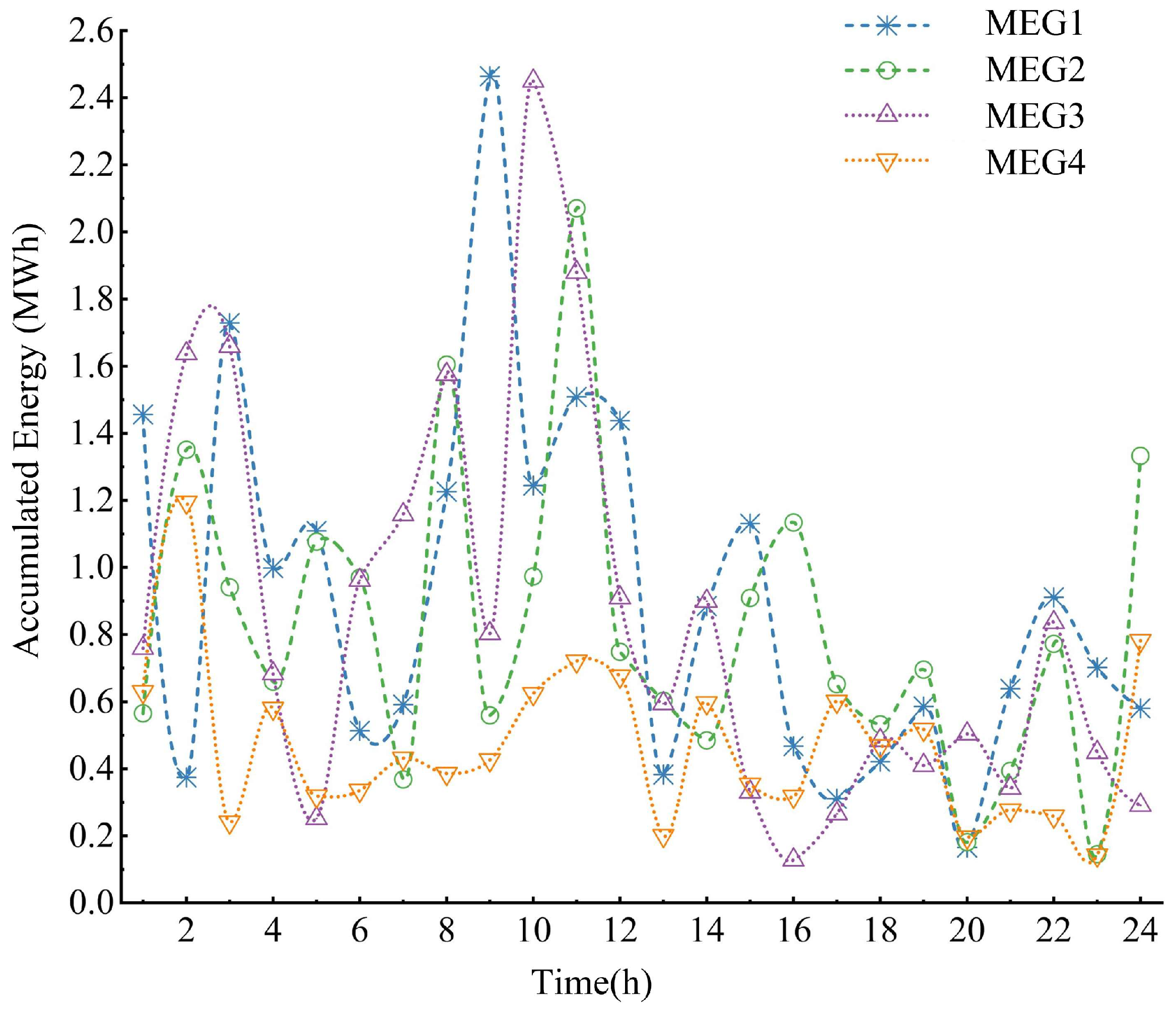
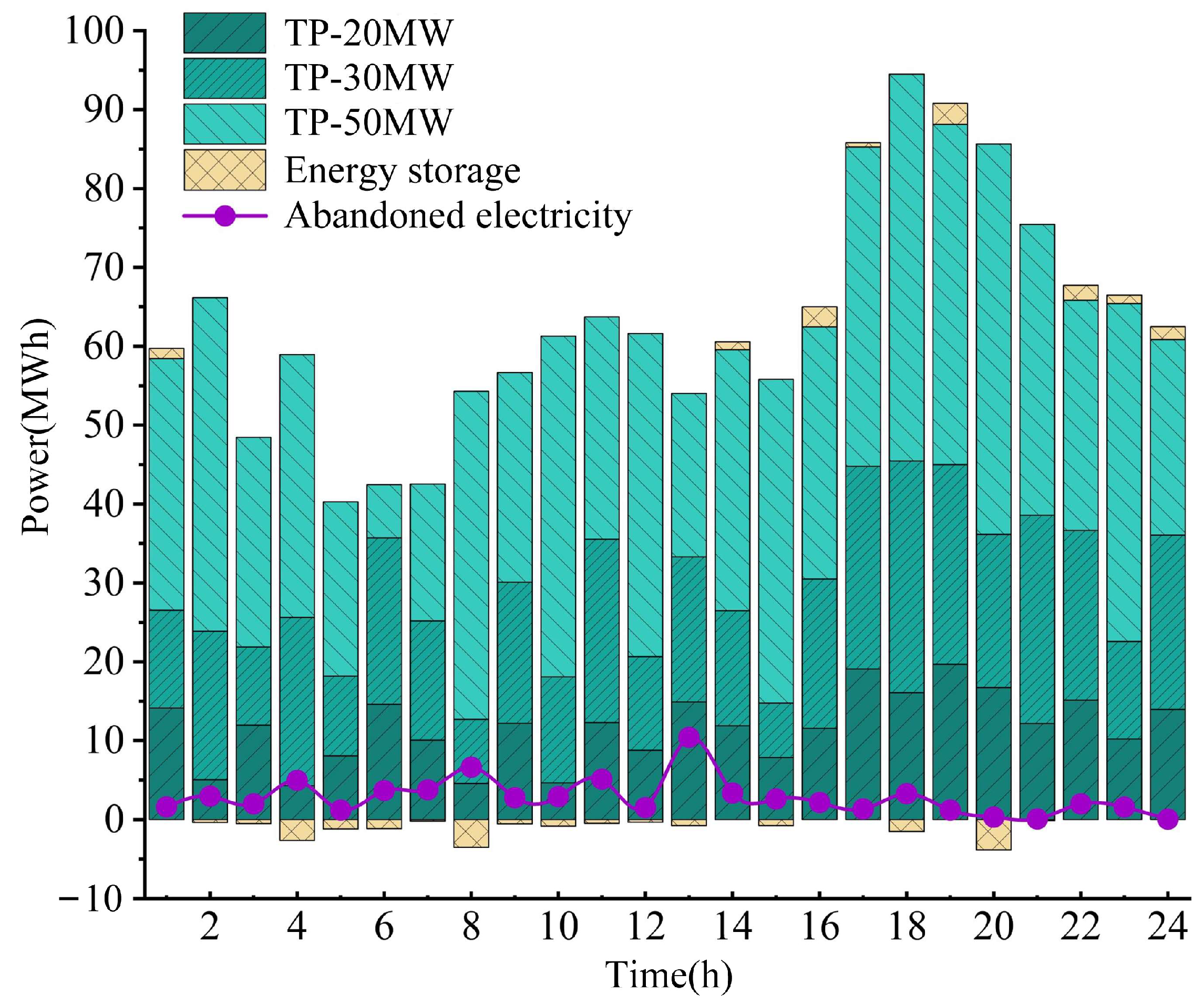
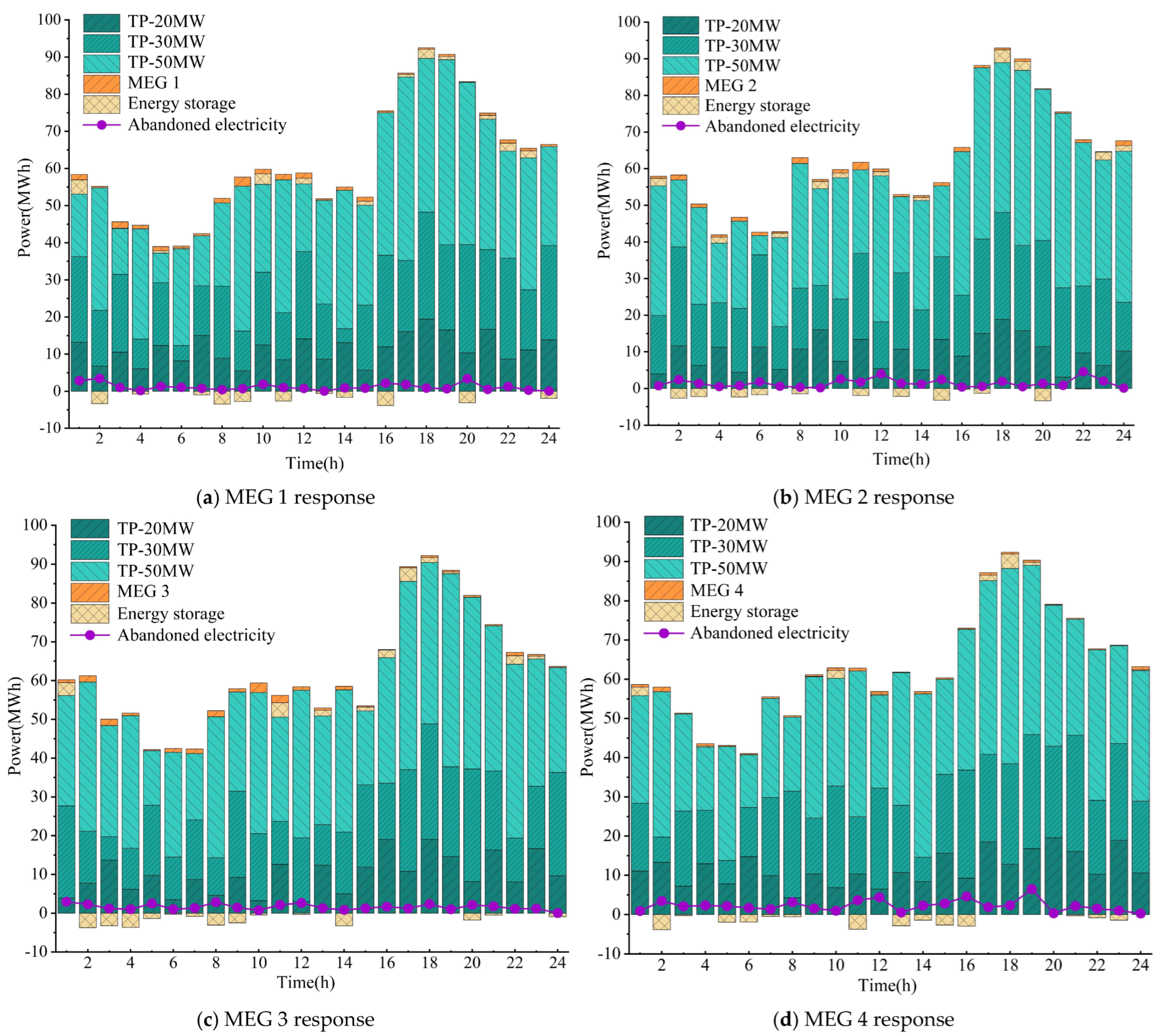
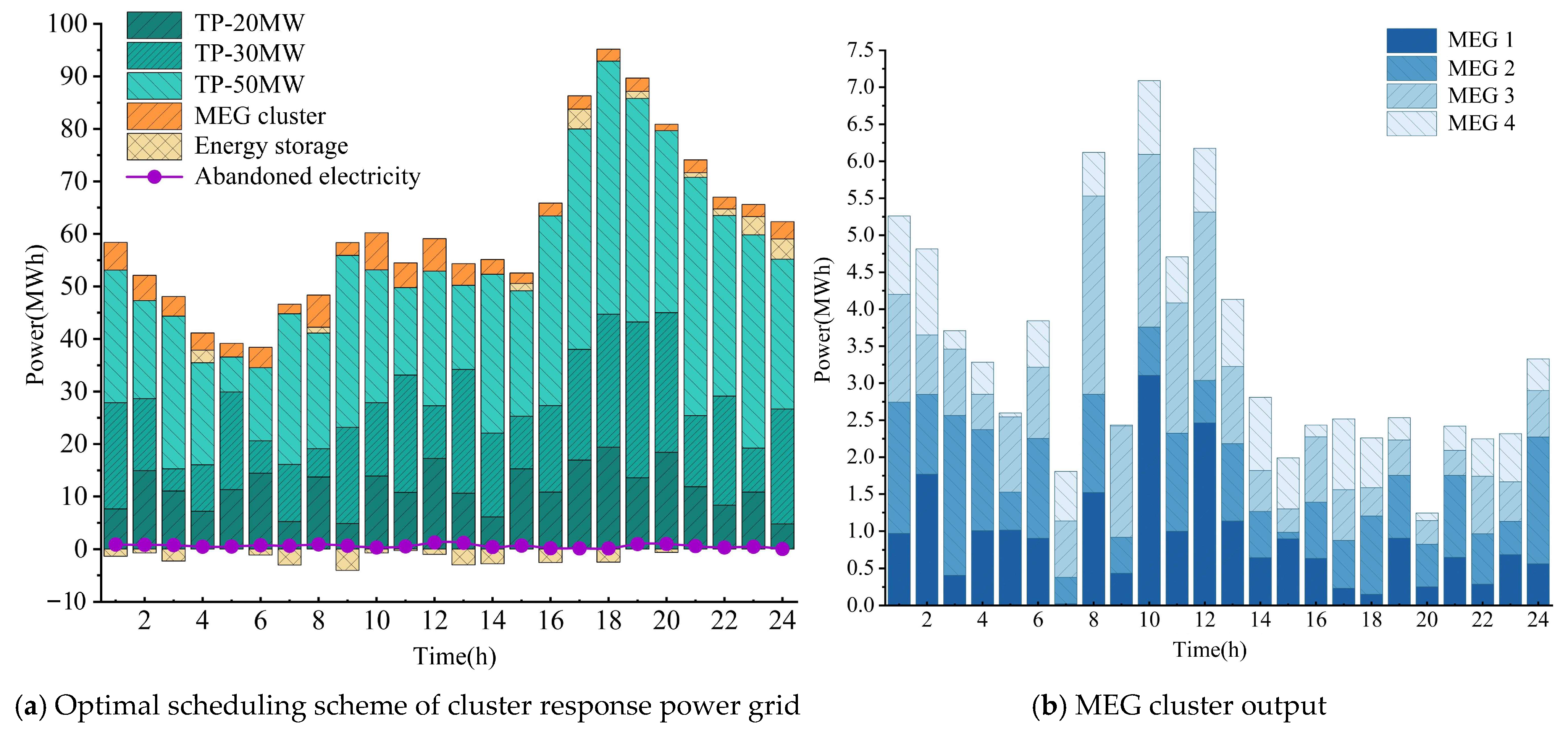
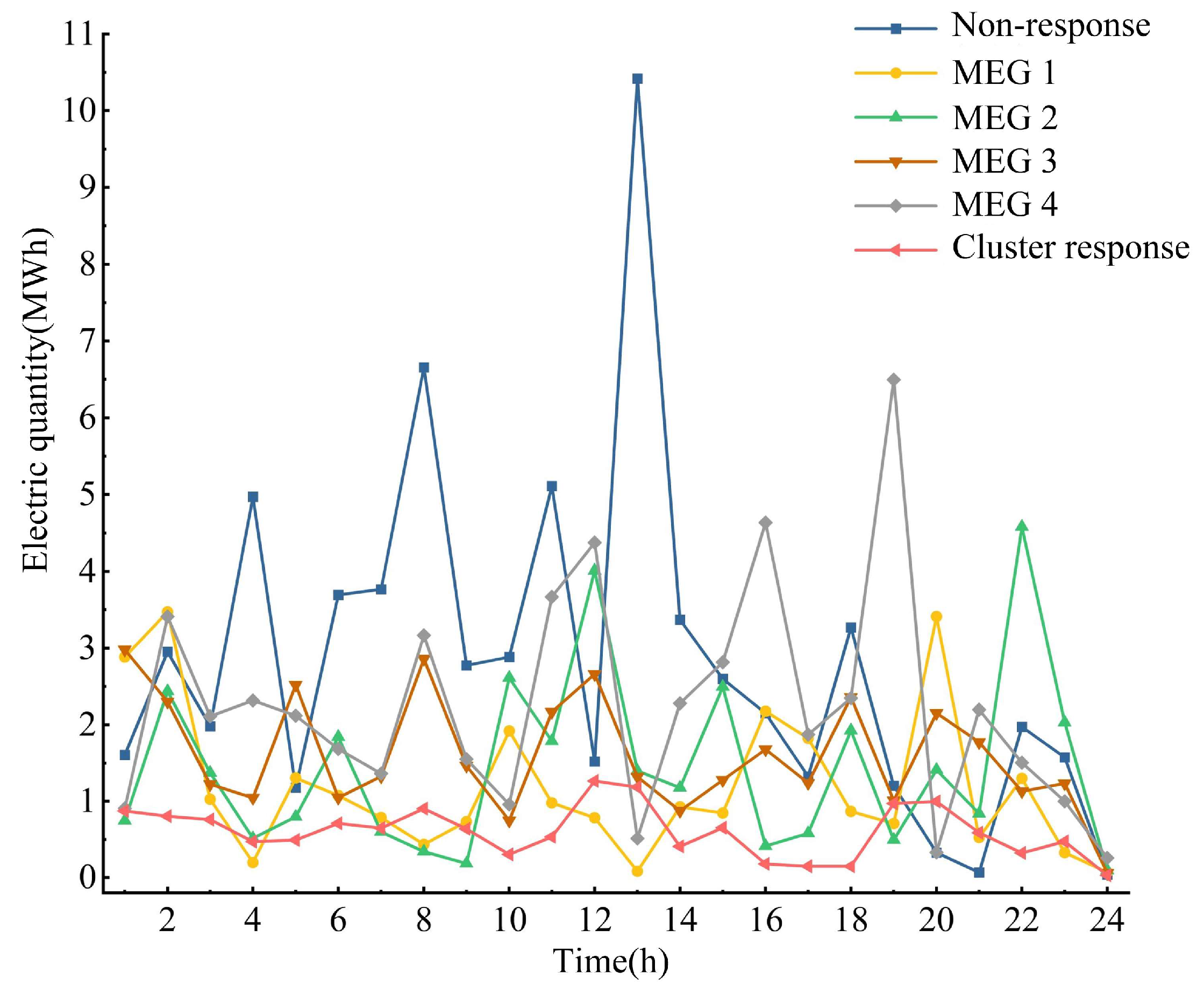
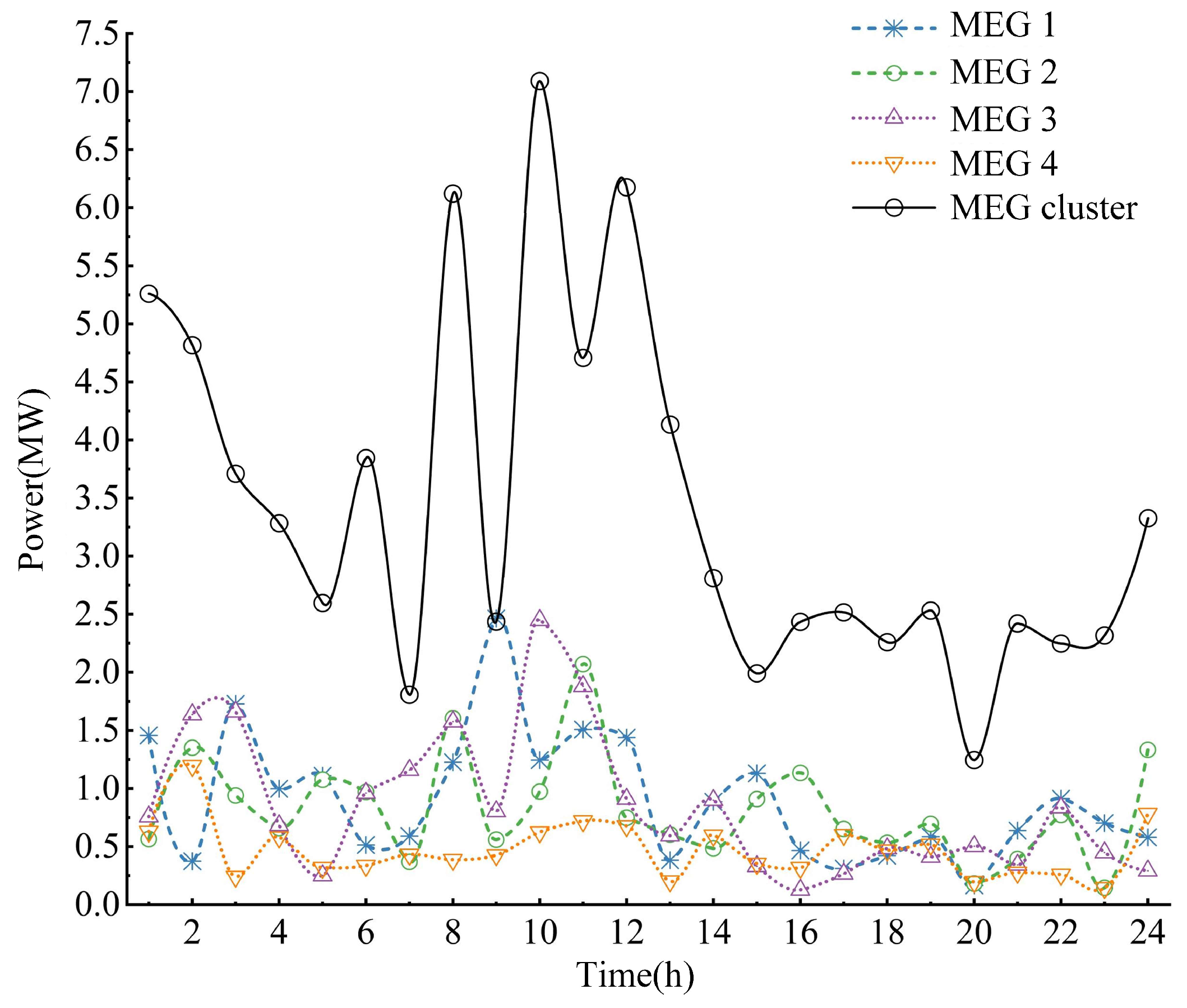
| Unit | MEG 1 | MEG 2 | MEG 3 | MEG 4 |
|---|---|---|---|---|
| WT | √ | - | √ | √ |
| PV | √ | √ | √ | √ |
| CHP | √ | √ | √ | - |
| Accumulator | √ | √ | - | √ |
| TP Parameters | Unit 1 | Unit 2 | Unit 3 | Energy Storage Parameters | Electric Energy Storage |
|---|---|---|---|---|---|
| 20 | 30 | 50 | 20 | ||
| 0.79 | 0.75 | 0.72 | 5 | ||
| 0.001124 | 0.000131 | 0.000169 | 5 | ||
| 0.28730 | 0.23222 | 0.27601 | 0.9/0.9 | ||
| 4.07362 | 16.00726 | 11.46196 | 18 | ||
| 10 | 15 | 25 | 0.9 | ||
| 8 | 12 | 20 | 0.1 | ||
| 13 | 10 | 9 | 0.013 |
| Numerical Value | Scenario 1 | Scenario 2 | Scenario 3 | ||||
|---|---|---|---|---|---|---|---|
| MEG 1 | MEG 2 | MEG 3 | MEG 4 | ||||
| Total Costs (104 CNY) | 141.79 | 136.04 | 137.73 | 137.08 | 140.39 | 132.33 | |
| Power (MW) | WT | 457.71 | |||||
| PV | 100.50 | ||||||
| TP-20MW | 280.07 | 273.78 | 235.57 | 237.78 | 282.83 | 279.69 | |
| TP-30MW | 424.30 | 438.26 | 471.47 | 419.91 | 465.64 | 385.71 | |
| TP-50MW | 803.44 | 719.21 | 751.99 | 793.63 | 751.37 | 686.46 | |
| MEG 1 | - | 21.83 | - | - | - | 21.66 | |
| MEG 2 | - | - | 19.72 | - | - | 22.52 | |
| MEG 3 | - | - | - | 20.27 | - | 23.86 | |
| MEG 4 | - | - | - | - | 11.28 | 14.03 | |
| Energy storage charging | 18.68 | 24.84 | 22.69 | 25.77 | 25.41 | 25.95 | |
| Energy storage discharging | 12.65 | 19.47 | 19.80 | 19.69 | 11.06 | 19.55 | |
| Abandoned electricity | 67.42 | 28.67 | 34.69 | 38.49 | 53.89 | 14.50 | |
| Power discard rate (%) | 12.08 | 5.14 | 6.21 | 6.89 | 9.65 | 2.60 | |
Disclaimer/Publisher’s Note: The statements, opinions and data contained in all publications are solely those of the individual author(s) and contributor(s) and not of MDPI and/or the editor(s). MDPI and/or the editor(s) disclaim responsibility for any injury to people or property resulting from any ideas, methods, instructions or products referred to in the content. |
© 2025 by the authors. Licensee MDPI, Basel, Switzerland. This article is an open access article distributed under the terms and conditions of the Creative Commons Attribution (CC BY) license (https://creativecommons.org/licenses/by/4.0/).
Share and Cite
Zhang, H.; Zhang, O.; Li, P.; Yue, X.; Tan, Z. Two-Stage Robust Optimization Model for Flexible Response of Micro-Energy Grid Clusters to Host Utility Grid. Energies 2025, 18, 3030. https://doi.org/10.3390/en18123030
Zhang H, Zhang O, Li P, Yue X, Tan Z. Two-Stage Robust Optimization Model for Flexible Response of Micro-Energy Grid Clusters to Host Utility Grid. Energies. 2025; 18(12):3030. https://doi.org/10.3390/en18123030
Chicago/Turabian StyleZhang, Hongkai, Outing Zhang, Peng Li, Xianyu Yue, and Zhongfu Tan. 2025. "Two-Stage Robust Optimization Model for Flexible Response of Micro-Energy Grid Clusters to Host Utility Grid" Energies 18, no. 12: 3030. https://doi.org/10.3390/en18123030
APA StyleZhang, H., Zhang, O., Li, P., Yue, X., & Tan, Z. (2025). Two-Stage Robust Optimization Model for Flexible Response of Micro-Energy Grid Clusters to Host Utility Grid. Energies, 18(12), 3030. https://doi.org/10.3390/en18123030





